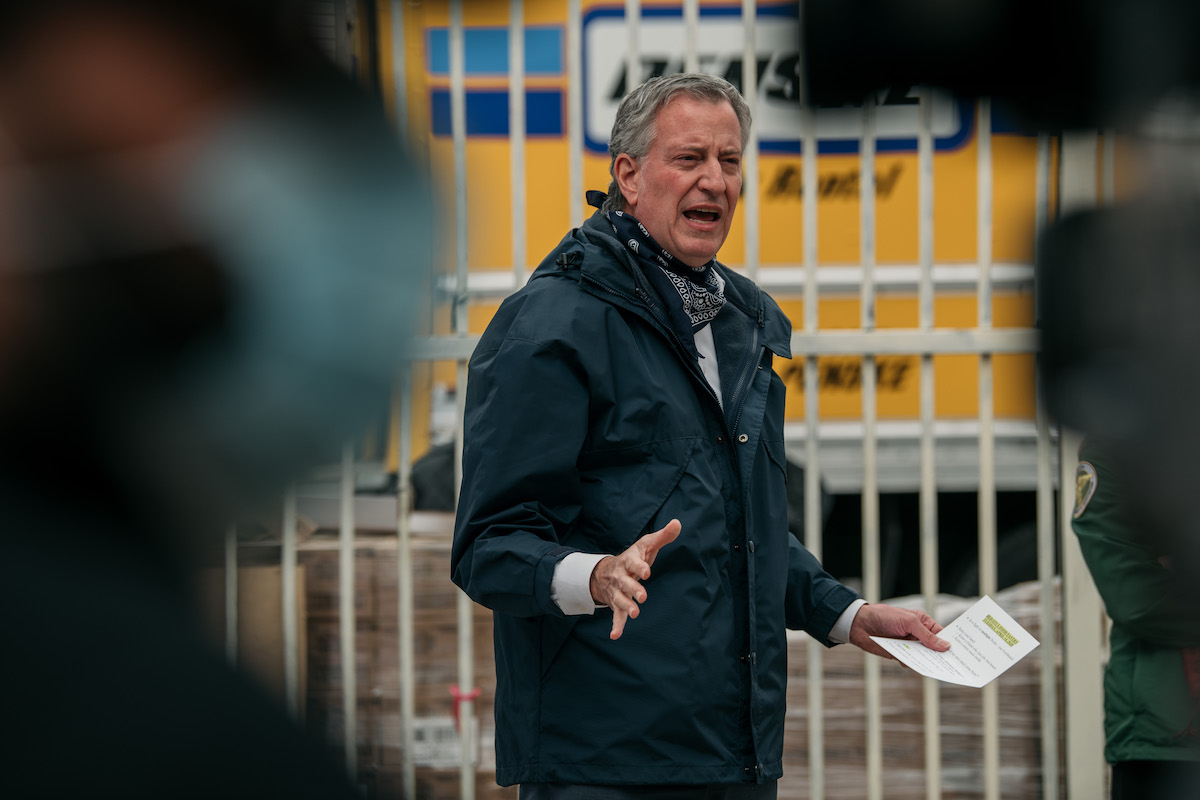For Jews like me who grew up outside of Lakewood, New Jersey, the discourse around Mayor de Blasio’s recent tweet is nothing new. If you didn’t see the tweet that spurred a million hot takes, de Blasio responded to a funeral for a rabbi that drew hundreds of Orthodox Jews to the streets of Williamsburg, Brooklyn by tweeting, “My message to the Jewish community, and all communities, is this simple: the time for warnings has passed. I have instructed the NYPD to proceed immediately to summons or even arrest those who gather in large groups. This is about stopping this disease and saving lives. Period.” The message was swiftly criticized by Jews and others for unfairly targeting all Jews, the majority of whom are following social distancing guidelines.
Lakewood is known as the hub of American Haredi life (a group within Orthodox Judaism also referred to as ultra-Orthodox), with a rapidly growing population of 100,000 residents, the majority of whom are Haredi. This put me in an interesting position as a non-Orthodox Jew. On the plus side, our supermarkets had kosher food as far as the eye could see. The con: Due to deep communal divides between Haredi and non-Jews, I was one of, if not the only, Jew that my friends and teachers personally knew, which made me the soundboard for their negative thoughts about Haredim. Occassionally their complaints were downright misinformation or anti-Semitic conspiracy theories, but most surrounded current events. Scandals about the Haredi community seemed to always be in the papers: Haredi realtors pressuring non-Jews to move out of their neighborhoods, drivers without licenses, and couples arrested of welfare fraud.
Each controversy played into their anti-Semitic sentiments as they joked about how Jews are cheap, deceptive, and bad drivers. Their disclaimer was always that I “wasn’t like those Jews,” and I nodded along. I was quick to throw this community under the bus if it meant that I wasn’t the target of anti-Semitic comments, and anyway, was the sentiment really anti-Semitic if it was based on real events?
Then other days, newsletter headlines put a pit in my stomach. The scandals often coincided with anti-Semitic hate crimes — online and verbal harassment and threats, more than 100 tires of Jewish car-owners slashed, an anti-Semitic banner over a congregation’s Holocaust memorial, and a campaign to move Haredim out of the area that used anti-Semitic rhetoric. These events disturbed me but did not cause much alarm, because as someone who wasn’t visibly Jewish, I did not face much risk. It would be much easier to insist that I was a “different kind of Jew” and note that Haredi actions triggered these anti-Semitic incidents.
Eventually, I realized that my passivity in the face of comments against Haredim did nothing but fuel the anti-Semitism that my Haredi siblings were at the forefront of. By repeatedly reminding gentiles that not all Jews are Haredi, separating myself from them, I was perpetuating the anti-Semitic notion that Haredi are the Other, backwards, and untrustworthy. I may fundamentally disagree with how they interpret and follow Jewish law, but that does not erase the fact that they are Jews. Just like I ask people not to view all Jews as a monolith, I should remember that the Haredi are not a monolith either. Contrary to the narrative that our local newspapers told, the tens of thousands of local Haredim were not all committing crimes.
It is possible to critique specific actions of certain people without generalizing the community with anti-Semitic tropes. In Lakewood, this shows up when critiques paint Haredim as sneaky, cheap, and untrustworthy. During the current pandemic, it is when people blame Haredi Jews for spreading COVID-19, perpetuating the centuries-old conspiracy that Jews are vermin who spread diseases.
So while yes, Mayor de Blasio deserved to be called out for conflating the actions of one particular community with the entire Jewish community, Jews should also keep this in mind before critiquing his tweet. In defending yourself and the broader Jewish community, are you putting the blame on all Haredi or Orthodox sects?
To clarify: It is not okay that some communities are flouting social distancing rules. This disregard for public safety is irresponsible for the health of themselves and all New Yorkers.
However, when a huge amount of attention is given to these bad actors, we must ask ourselves: Where is the attention to the Orthodox communities that have organized testing facilities, blood plasma donation centers, and food banks? Or the Orthodox rabbis who have made exceptions to Jewish law so their community can social distance, because the holiest Jewish act is to save a life? Where are the articles noting the synagogues who were closed way before legal rulings, Jews who have made major modifications to important rituals such as burials and daily prayer? How many Jews celebrated Passover by themselves for the first time in their lives this month?
And by the way, why is the country only talking about Haredi Jews who are not social distancing, and not the Florida megachurch that held two services with over 500 people each, or the spikes in COVID cases that are due to Easter gatherings?
If your only examples of Jewish responses to COVID-19 are Haredi Jews breaking social distancing, and your only examples of social distancing breaches are Jews, that is the result of anti-Semitism, both in the media and unconsciously internalized.
Just like in Lakewood, these anti-Semitic attitudes have real consequences; hate crimes against Haredi Jews in New York and cities nationwide are higher than they have been in years, with an increasing number of violent incidents.
Anti-Semitism has led society to target the most visible Jews, and we will not achieve our liberation by continuing to other those who have not assimilated.
This truth is of course nuanced, and grappling with it is very difficult for me. I am a non-binary Reconstructionist Jew who aspires to be a rabbi. I am very aware of the fact that I may not have received an equal education in some Orthodox communities because of my assigned gender at birth, and that I could be rejected from them because of my queerness, and that many will not acknowledge me as a rabbi. Yet that does not make generalizing them acceptable, especially when the rhetoric plays into anti-Semitic tropes. This not only harms the entire Jewish community, but physically harms the Haredi community, and will not cause them to adopt more progressive ideologies. Only compassion, understanding, and solidarity can.
Now is not the time for further divisions. We cannot allow fear to allow us to turn on one another. Pluralism does not excuse us from critiquing each other when we do problematic things or spout harmful ideologies; it means standing by each other when we are attacked, and acknowledging that we are all part of the same faith and the larger Jewish community.
Header Image: New York City Mayor Bill de Blasio speaks at a food shelf organized by The Campaign Against Hunger in Bed Stuy, Brooklyn on April 14, 2020 in New York City (Photo by Scott Heins/Getty Images).



